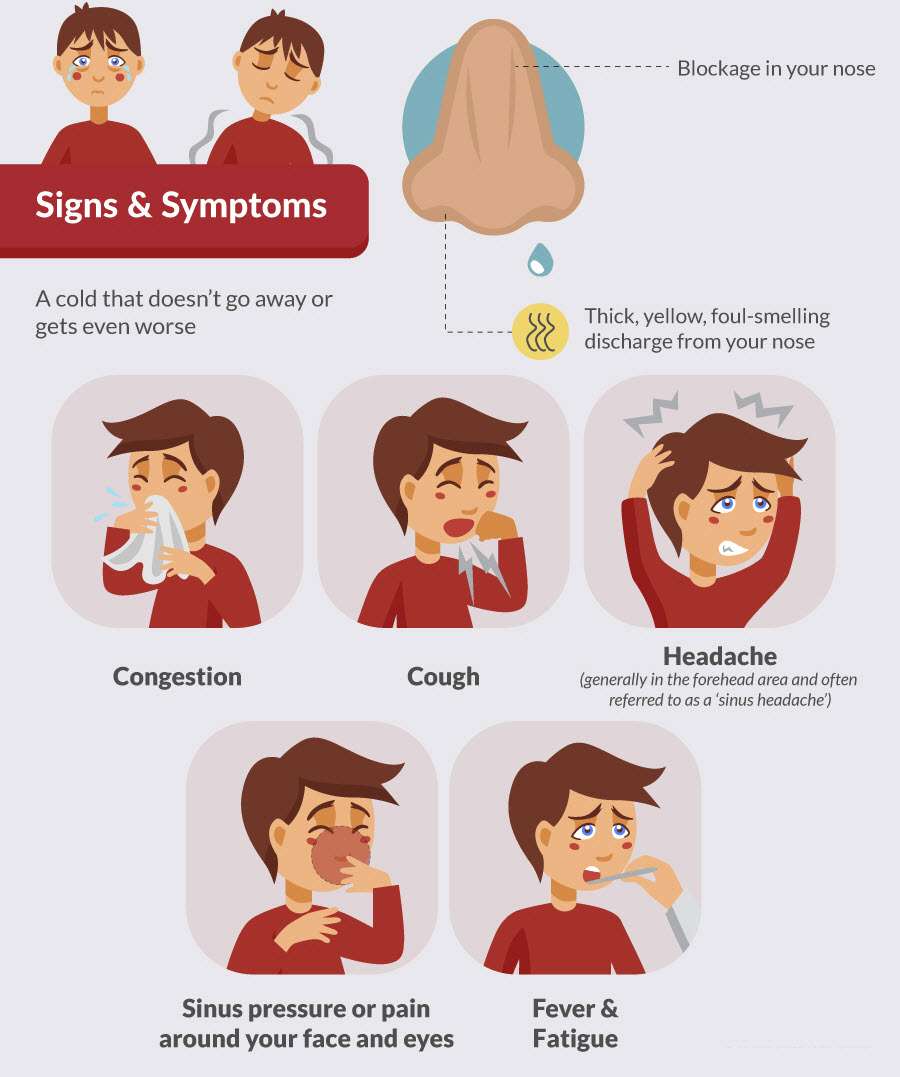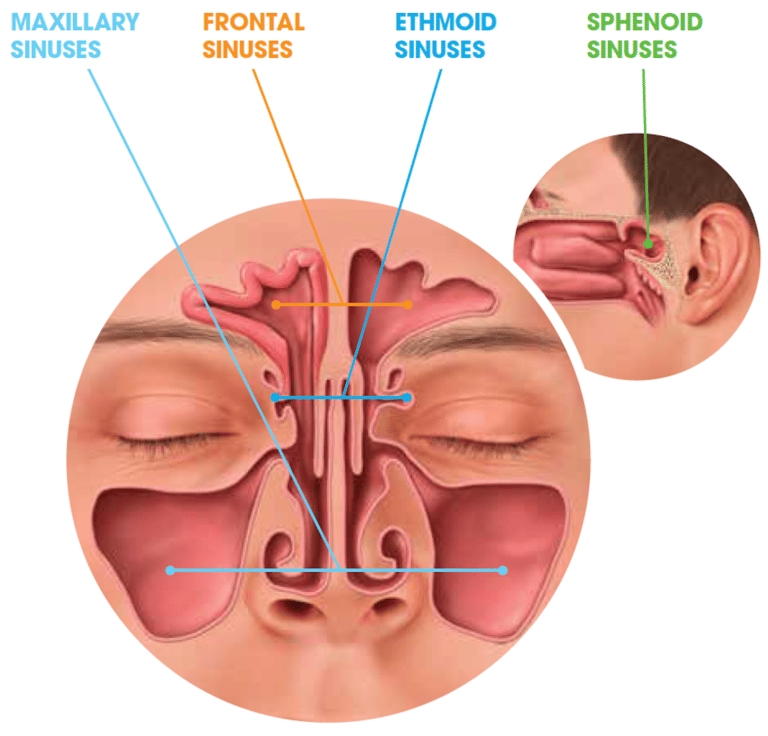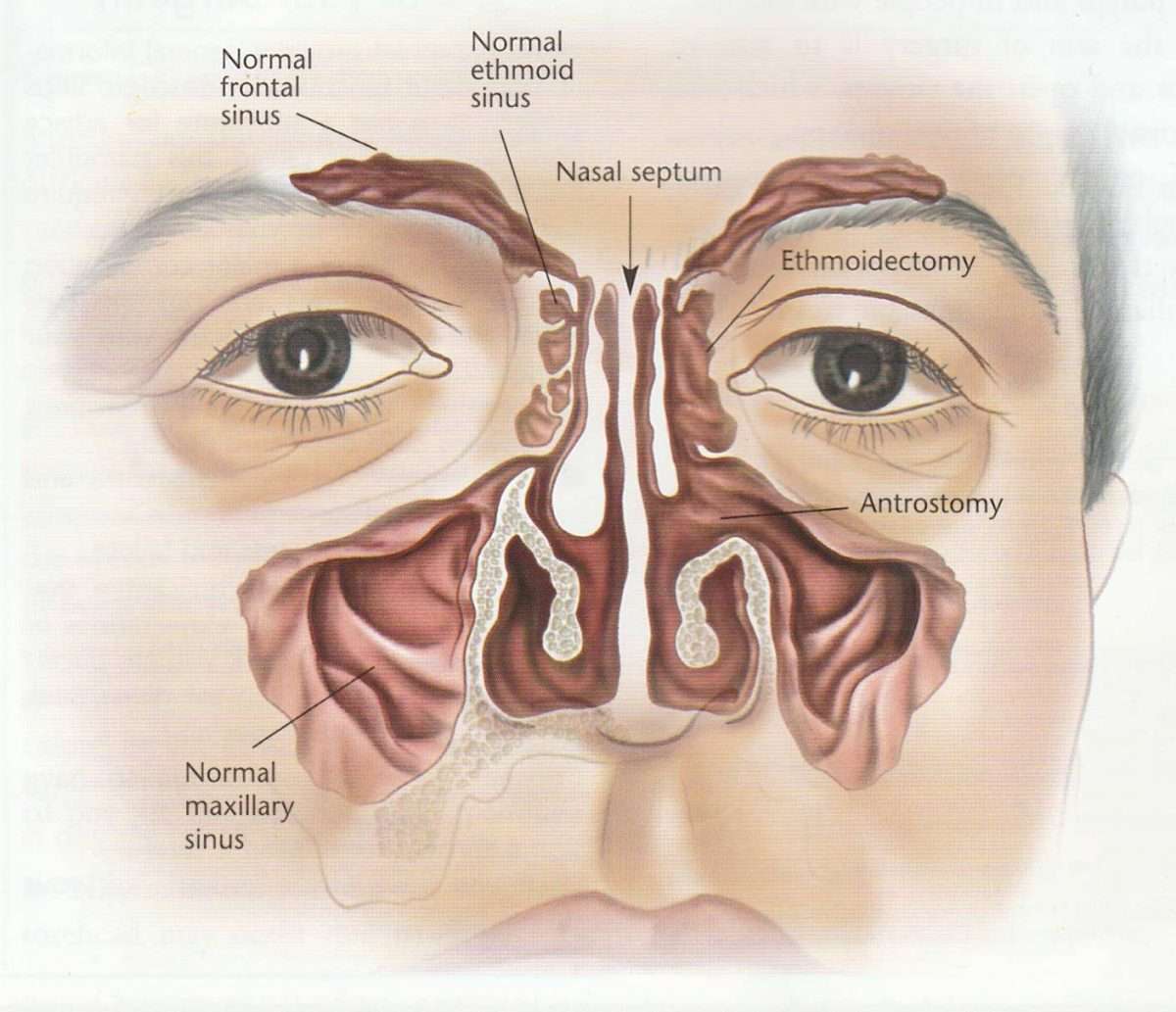An Introduction To Your Sinuses
You have four pairs of sinuses located around your nose and eyes. These air-filled chambers vibrate, adding tonality to your speech, and the mucous membranes that line them filter the air you breathe.
The membranes, or mucosa, can produce up to a quart of mucus per day. As the mucus continually drains away down the back of your throat, it traps bacteria, germs, and viruses. The mucus also keeps your throat and nasal cavities from feeling dried out and scratchy. When you have a sinus infection, your sinus cavities swell and stop draining. The trapped mucus can become infected, causing even more congestion and inflammation, which causes further swelling and blockage. Its a vicious cycle. When this happens over and over, or happens and doesnt go away for weeks or months, you have sinusitis.
Loss Of Taste And Smell: How To Get Your Sense Of Taste & Smell Back After A Sinus Infection
July 23, 2021 Written by: Michael Menachof Categories: Nose, Sinus
Dr. Menachof, MD, has specialized in conditions around the head, throat, ear, nose, neck and face for over 20 years, and was the first to bring sublingual allergy drops to Colorado in 2005. He has been recognized as a Fellow by multiple academies, named one of Americas Top Facial Plastic Surgeons continually since 2003 and is featured in multiple national publications.
Experiencing a loss of taste or smell? Learn more about what causes it and how to get your senses back after a sinus infection.
Have you ever noticed that a certain food didnt taste as good as it used to? Or that a once pungent smell didnt bother you as much? Maybe you took a whiff of those spring flowers and smelled nothing! While certainly alarming, this is most likely a result of a very common condition called anosmia, or the loss of your sense of smell.
Since our smell and taste buds are so closely linked, any conditions or irritants that cause swelling in the nasal passages can lead to a loss of smell and therefore taste. While typically just a temporary nuisance, loss of smell can also pose a dangerous threat, as your sense of smell is responsible for alerting you to dangers like gas leaks, rotten food, or fire. And because it affects your sense of taste, it can also lead to loss of interest in eating that results in unwanted weight loss and malnutrition.
How Sinusitis Can Contribute To Other Health Problems
Nasal issues can impact your overall health. Poor airflow can make breathing through your nose difficult and increase your risk of suffering from certain problems, such as sleep apnea, a condition characterized by frequent pauses in breathing during sleep.
Narrowed and clogged nasal passages can also increase your risk of suffering from complications of infection. Furthermore, lasting inflammation can damage the delicate tissues lining your sinuses. Last not least, the brain is in close anatomical vicinity to the sinuses, and an infection could easily spread from the sinuses to the brain, causing meningitis.
Recommended Reading: Sinus Infection Day By Day
What Is A Sinus Infection
âSinusitis or rhinosinusitis, commonly known as a sinus infection, is an inflammation in the nasal cavity and paranasal sinuses,â says Kavita Shanker-Patel, MD, a family medicine physician at Northwestern Medicine Central DuPage Hospital. âA sinus infection typically lasts less than four weeks.â
The most common causes of sinus infections are viruses. But you can also have a bacterial rhinosinusitis, though itâs less likely. These occur in only about 0.5 to 2 percent of sinus infection episodes, according to Dr. Shanker-Patel. âThis happens when bacteria secondarily infect an inflamed sinus cavity, and most commonly occurs as a complication of a viral infection,â she explains.
Typical sinus infection symptoms include:
- Nasal congestion
Treatment For Lost Or Changed Sense Of Smell

Your sense of smell may go back to normal in a few weeks or months.
Treating the cause might help. For example, steroid nasal sprays or drops might help if you have sinusitis or nasal polyps.
A treatment called smell training can also help some people. The organisation Fifth Sense has more about how to do smell training.
Sometimes changes in sense of smell cant be treated and may be permanent.
Recommended Reading: Best Sinus Medicine With Pseudoephedrine
Don’t Miss: What Is Good To Take For Sinus Pressure
How To Enjoy Food With A Smell Or Taste Disorder
If you lose your sense of taste, here are things you can try to make your food taste better:
- Prepare foods with a variety of colors and textures.
- Use aromatic herbs and hot spices to add more flavor however, avoid adding more sugar or salt to foods.
- If your diet permits, add small amounts of cheese, bacon bits, butter, olive oil or toasted nuts on vegetables.
- Avoid combination dishes, such as casseroles, which can hide individual flavors and dilute taste.
Loss Of Smell And Taste After Sinus Infection
Ask U.S. doctors your own question and get educational, text answers â its anonymous and free!
Ask U.S. doctors your own question and get educational, text answers â its anonymous and free!
HealthTap doctors are based in the U.S., board certified, and available by text or video.
You May Like: Natural Nasal Spray For Sinus Infection
Read Also: What Are Some Symptoms Of Sinus Problems
Head Injury Or Trauma
The brain plays a crucial role in processing smell, and taste, and any injury to trauma to the brain can impact your senses for a limited time. If the olfactory nerves, the nerves in the brain responsible for processing smell, are damaged, you could experience a temporary or permanent loss of smell. With time and proper treatment, your senses of smell and taste could return to normal.
Recommended Reading: What Causes Fungus Ball In Sinus
How To Deal With Loss Of Smell Because Of Sinusitis
t lch khám ti vin, Quý khách vui lòng bm sHOTLINE hoc t lch trc tip TI ÂY. Ti và t lch khám t ng trên ng dng MyVinmec c gim ngay 15% phí khám khi t hn khám ln u trên toàn h thng Vinmec . Quý khách cng có th qun lý, theo dõi lch và t hnt vn t xa qua video vi các bác s Vinmec mi lúc mi ni ngay trên ng dng.
XEM THÊM:
You May Like: What Can You Take For A Sinus Headache
Tips From A Dental Hygienist
Metallic taste and sinus infections can negatively affect your overall quality of life. As a Registered Dental Hygienist, I would like to share some tips with you! As always, if you have any health concerns or questions, consult with your healthcare professionals.
Do not regularly drink sugary beverages. Sipping on high sugar beverages will significantly increase your risk for cavities as well as other oral health infections.
Moreover, make sure you are visiting your dentist regularly for routine check-ups and cleanings to stay on top of your oral health. Poor oral health not only effects your mouth but it may also affect your overall systemic health.
It is crucial to be aware of your metallic taste symptoms, especially if you have chronic sinus infections.
How To Clean Your Nose With A Salt Water Solution
You dont need to use all of the solution, but make a fresh batch each day dont re-use any left over from the day before.
Some pharmacies sell sachets you can use to make a salt water solution and devices to help you rinse your nose.
Read Also: Is Advil Cold And Sinus An Antihistamine
Also Check: Whats The Difference Between Allergies And Sinus
How Does Loss Of Smell Happen
The nerves responsible for detecting smell are located high and deep inside the nose. When you have a cold or sinusitis, your nose fills with mucus and causes swelling. Because of this mucus and inflammation, the smell cant reach the top of the nasal cavity this results in a total or a partial loss of smell.
I Lost My Sense Of Smell: Do I Have Covid

Do I have COVID-19 or is it something else? This question has probably crossed your mind a time or two or maybe even 20. COVID-19 symptoms can be so similar to other conditions, its not unusual to search your symptoms to see if you need to be tested.
One COVID-19 symptom thats frequently Googled: smell loss.
There are actually a variety of reasons other than COVID-19 why someone may lose their sense of smell, says Bobby Tajudeen, MD, director of rhinology, sinus surgery and skull base surgery at Rush University Medical Center. It can be due to nasal or sinus inflammation, or other viral infections distinct from COVID-19. And it can even occur as a result of some neurodegenerative diseases like Alzheimers or dementia or vitamin deficiencies. Rarely tumors can present with smell loss.
So how do you know if its COVID-19 or something else thats keeping you from enjoying the fragrant scent of your Christmas tree or the aroma of freshly baked holiday treats? And when should you see a specialist for smell loss?
Tajudeen says that while smell loss from congestion or common viral infections and COVID-19-related smell loss may feel the same on the surface, whats happening internally and how the symptoms present themselves is actually very different.
You May Like: Can Sinus Congestion Cause Dizziness
How Can Sinus Problems Affect Your Taste Buds
If you are having problems with your ability to taste or smell, you are certainly not alone. 200,000 people visit the doctor every year to address a problem with their ability to taste or smell, and sinus infections are one of the leading causes of reported loss. There are a few factors to consider when determining the nature of your acute sinusitis that require individualized treatment, but what they all have in common is that they can affect your ability to taste and smell.
A lack of ability to taste is most commonly linked to an inability to smell. Your sense of smell is activated when you chew through a channel connecting the roof of your mouth and throat to your nose. If this channel is blocked by sinus pressure, inflammation, or excess mucus, your odor receptors will not activate, and you will lose most of your ability to taste.
Cleaning Inside Your Nose Can Help
Rinsing the inside of your nose with a saltwater solution may help if your sense of smell is affected by an infection or allergy.
You can make a saltwater solution at home.
You do not need to use all of the solution, but make a fresh batch each day do not reuse any left over from the day before.
Some pharmacies sell sachets you can use to make a saltwater solution and devices to help you rinse your nose.
Read Also: Best Otc Allergy Medicine For Sinus Pressure
Why Does My Sneeze Smell Like Ammonia
If you smell ammonia when you sneeze, you could have a serious issue, such as a liver or kidney problem. A doctors visit can help narrow down the source and help you get the treatment you need.
It is important to be in tune with our bodies, as they can sometimes give us subtle clues regarding our health that can be identified before a problem develops into something more substantial, CEENTA ENT DoctorChristopher Tebbit, MD, said.
If you are concerned about what you smell when you sneeze, dont hesitate to make an appointment with a CEENTA ENT doctor.
This blog is for informational purposes only. For specific medical questions, please consult your physician. Dr. Tebbit practices in our Belmont office. To make an appointment with him or any of our ENT doctors, call 704-295-3000. You can also schedule an appointment online or through myCEENTAchart.
What Are The Symptoms Of Fungal Sinusitis
Symptoms of fungal sinusitis are similar to other forms of sinusitis, including:
- Nasal congestion
- Loss of smell or foul odor in the nose
Fungal sinusitis can be quite severe in anyone with a compromised immune system, and can cause:
- Changes of the skin
- Facial swelling of cheeks or eyelids
css id:
Recommended Reading: How To Stop Sinus Infection Pain
Read Also: Can A Sinus Infection Cause Loss Of Smell And Taste
The Importance Of Diagnosis
Losing smell or taste might sound minoruntil you experience it. Smell and taste are both important for overall health. A strong sense of smell can help you identify dangers like a gas leak or spoiled food. A sense of taste is important for feeling satisfied while eating. People with loss of taste and smell are at increased risk for diabetes, high blood pressure, and depression.
You May Like: What To Relieve Sinus Pressure
How Do You Cure Loss Of Taste And Smell
04/8Garlic. Garlic has emerged as a strong anti-viral and immunity-boosting remedy during the pandemic. Ayurveda suggests that the pungent garlic may also contain properties which soothe swelling and inflammation around the nasal passage, ease breathing and eventually, help restore the sense of smell and taste faster.
Don’t Miss: How Often To Take Advil Cold And Sinus
How To Stop Postnasal Drip
A combination of preventative measures and medications can help put a stop to postnasal drip. Healthcare providers may recommend:
-
Staying hydrated, which can also help to thin mucus
-
Use a humidifier or vaporizer to keep the air moist
-
Propping yourself up with extra pillows when you sleep, so the mucus doesnt collect in the back of your throat
-
An oral medication such as guaifenesin , which can thin mucus
Its important to keep in mind that treatment for postnasal drip usually depends on what might be causing it. For instance, if your symptoms are caused by allergies, the first step might be trying to pinpoint what you are allergic to and avoiding those foods or triggers to the extent possible.
As a next step, there are several over-the-counter and prescription medications that can provide additional relief. They can help treat postnasal drip by calming down inflammation and thinning or drying up the mucus. Lets take a look at the different types of medications that you and a healthcare provider can consider to help stop postnasal drip.
Recommended Reading: Can Sinus Cause Ringing In Ears
Isnt Loss Of Smell Or Taste An Early Symptom Of Covid

There are still studies underway but so far experiencing a loss of smell and/or taste is a potential indication of having COVID-19 as a recent study shows . It can occur suddenly and with varying timelines for when your senses will return back to normal. Its also not uncommon for upper respiratory infections such as the common cold or flu to affect our senses of taste and smell.
Also Check: Best Over The Counter Medicine For Sinus Pressure And Pain
How A Disordered Sense Of Smell And Taste Relate
The senses of smell and taste are very closely linked. Most people who visit a doctor because they think they have lost their sense of taste are surprised to learn they have a smell disorder instead. Generally, a smell or taste disorder will fall into these four categories:
Anosmia: Loss of sense of smell.
Ageusia: Loss of sense of taste. .
Hyposmia: Reduced ability to smell.
Hypogeusia: Reduced ability to taste sweet, sour, bitter, or salty things. .
According to Dr. Wendy McConnell, About 80 percent of taste disturbances are actually related to changes in a persons sense of smell. Most often changes in smell are caused by temporary conditions that cause irritation or swelling in the nasal cavity, like a sinus infection, allergies or a cold, she says.
Dr. McConnell, who is a board certified INTEGRIS Health otolaryngologist and an expert in sinus disorders and rhinology, says that loss of taste, or disturbance of taste, is not uncommon with sinus infections or colds. In fact, Most people will notice their taste is altered, and some foods may taste different or not as distinct as before, she says. Thankfully, Treating the cause of nasal swelling will usually resolve the alteration of taste.
Can You Have Sinusitis Without Mucus
It’s highly unlikely to experience sinus pressure without mucus buildup and congestion. But that isn’t the end of the story. Treatments for sinus pressure and migraines differ. If you self-diagnose incorrectly and take sinus pressure treatments for a migraine, you could actually make your situation worse.
Also Check: Children’s Medicine For Sinus Infection
A Burning Smell In The Nose Is Also A Symptom Of Covid
Experiencing a burning smell is sometimes an early symptom of COVID-19, but it isnt one of the typical symptoms. Its thought that inflammation inside your nose caused by the viral infection may contribute to its development.
Along with loss or changes in your sense of smell, other COVID-19 nasal symptoms can include a runny or snuffy nose, although theyre not always present in a majority of cases.